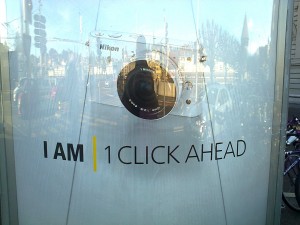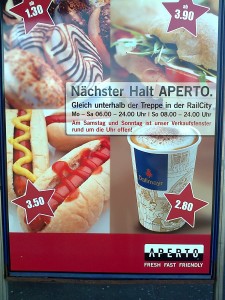Branding and language
As followers may already know, I recently visited a client in Switzerland. Although that meant three fairly intensive days of interviews and discussions, it was still a very enjoyable trip. And it gave me some ideas for a post, as things that happen to bloggers so often do.
One thing that struck me while visiting such a cosmopolitan country was the linguistic poverty of the UK. Of course, it is not news that many British people don’t bother to learn another language – everyone speaks English, so why bother? But it’s still genuinely humbling to be restricted to ‘hello’, ‘beer’, ‘please’ and ‘thank you’ when practically everyone you meet speaks both Swiss German and Hochtdeutsch (Standard or ‘German’ German), plus functional French, Italian and English.
Multilingual menu
During my visit, I saw people mixing languages freely, interspersing English words into German sentences and vice versa, or jumping from one language to another at will without throwing their interlocutors.
As far as I can tell from my A-level-French viewpoint, this sort of culture must give advertisers a new, fascinating dimension to their branding decisions: whether to choose the local language or go for English as the lingua franca. Agencies and copywriters must advise their clients on which language to use for which communications, and do the writing in whichever is appropriate.
Presumably, using English shuts out that segment of the population who don’t read it, or at least risks people missing out on some meaning. On a subtler level, I imagine that using English also sends a subtle meta-message about a brand’s values or aspirations.
One step too far
As you might expect, larger and more multinational brands seem more likely to deploy English. For example, Orange’s slogan in Switzerland (and other continental countries) is:
Today changes with Orange
I have to say, that feels a little clunky to me as a native speaker, and I’m far from clear on what it might actually mean. But maybe it’s one of those very high-level brand lines where the literal meaning is less important than the vibe. For Orange, it’s probably enough to drop some cool-sounding English in the vicinity of its already formidable and fully developed brand.
You can see another example in the picture, this time for Nikon:
I am | 1 click ahead

I find this one interesting because you need a fairly advanced understanding of English to get it. You need to know the English idiom ‘one step ahead’, and realise that this is a variation on it. That suggests a certain level of sophistication among the audience – but that sort of targeting might be Nikon’s intention.
More dangerous, in my view, is the demand placed on the audience’s attention. However clever they are, people still might not invest that much thought into a poster they see on the street, particularly if it’s not in their first language. If coolness gets in the way of your meaning, you’ve got problems – whatever language you’re writing in.
Mix and match
I also saw some ads that mixed up English and German. From my limited experience, it seems that English is often chosen for corporate or brand-level taglines, while the local language is more likely to be used for more informational or ‘selling’ content. I’ll leave you to decide what that implies about the relative importance of each type of message.
You can see this in the advert pictured for convenience store chain Aperto. The copy plays it safe by presenting the special offer in German, before switching into English for the tagline:
Fresh · Fast · Friendly

In my view, that line would be plenty good enough for an English-speaking country too – I can well imagine Tesco Express using something like it. The alliteration makes it memorable, the sentiment is appropriately upbeat and the language manages to plant the idea of cheapness in your mind without actually saying so. (This being Switzerland, however, ‘cheap’ is a decidedly relative concept.)
Ways of thinking
All this made me feel a little sad to come back to the UK, with its monochrome lingustic palette. Although English is certainly a rich language in itself, the opportunities for evocation, wordplay and cultural references must be that much deeper when you have more languages to play with.
More profoundly, if words are a way of thinking, then more languages means more ways to examine, discuss or solve a problem. In an industry like advertising, where new ideas are everything, that can only be good. To know other languages is to be more open – linguistically, culturally and intellectually. And that’s how every writer wants to be.
Comments (2)
Comments are closed.
I just came across this great post. You are absolutely right, us native English speakers are in a bit of a bubble – speaking another language brings a whole new dimension to your thinking and your writing.
In Switzerland, we have the diversity of four national languages, plus English in common use and of course the local dialect Swiss German. It’s a melting pot of writing inspiration, the styles, tones and differences in how native speakers of each language communicate is amazing. Too often Europe gets put in a ‘on size fits all’ box, that’s just not the case. Schwiezerdeutsch and Hochdeutsch approach the same message very differently.
We’re missing a trick and frustrating a huge market!
Bis bald!
Was an interesting article to read because in India where there is a plenty of mix of local languages with English and even mix between various local languages, some believe (including me, at times) that it is a shameful thing that one does not even have a grasp on one’s native language to speak in that language, purely. But certainly this mix is being used effectively in company ads.